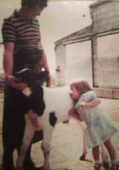In this insight blog, the focus is the raw milk debate. Ellen says “You may have an opinion based upon your professional knowledge or your personal experiences, but for this debate I must consider both. This morning I was interviewed by the BBC about raw unpasteurised milk, I provided fact, not my experience or opinion, so here’s the other side to my interview.”
The raw milk debate
This debate is an old argument which all relates to what people think is good for you, which may also be the cause of consumers' confusion. One of the highlights of the International Association for Food Protection conference in 2016 was a lively debate between experts from the pro-raw milk and the pro-pasteurisation sides of the argument. This can viewed here.
I am a food safety expert and I have consumed raw milk!
I was born and brought up on a dairy farm in north Wales. This is something that I'm very proud of and has resulted in me being passionate about the importance of supporting the Welsh farming community and the food and drink manufacturing industry. When I lived on the farm, every day I would walk over to meet my dad with my little red jug to get fresh milk for the day. It was raw unpasteurised milk. We would store it in the refrigerator for the day, and it would all be consumed. Because of the accessibility and availability of fresh raw milk, prolonged storage just didn't happen.

Ellen was brought up on a dairy farm in North Wales
Raw milk in Wales
Unlike Scotland where it is banned, consumers in Wales are able to purchase unpasteurised milk directly from producers at farms, in farm shops and at farmers’ markets. Every raw drinking milk producer must be registered with the Food Standards Agency (FSA). A list of these producers can be found from the FSA. Raw milk must carry a warning saying that it has not been heat-treated and may contain harmful bacteria. Furthermore, here in Wales there must be an additional warning for vulnerable groups.
The raw milk trend
In recent years, we’ve seen an increased consumer trend towards the consumption of raw, unpasteurised milk. Although the industry can take many steps throughout the production process of raw milk to reduce some potential risks, the risks associated with consumer awareness and handling are of concern.
Information about raw milk
There seems to be a lot of pro-raw milk related information available to consumers, however I do not believe there is enough information available regarding the potential risks to enable consumers to make an informed judgement about consuming raw unpasteurised milk, and may not apply the practices required to ensure food safety relating to this product at home.
What are the potential risks?
The consumption of raw unpasteurised milk is frequently associated with the incidence of foodborne illness such as E. coli, Salmonella, Listeria and Campylobacter, which can result in hospitalisation, long term ill-health and mortality. Statistics based upon outbreaks of foodborne illness associated with consumption of unpasteurised milk estimate that those that consume raw milk are over 800 times more likely to contract food poisoning. Consuming raw milk is particularly risky for those with weakened immune systems such as pregnant women, infants and children, or those with reduced immune function due to illness or treatment such as chemotherapy. Raw milk must be avoided by these vulnerable groups of consumers.
Why is there a greater risk?
Raw unpasteurised milk cannot be used in the same way as the pasteurised milk that we are all familiar with buying at the supermarket. The process of pasteurisation reduces the number of bacteria naturally found in milk so they are unlikely to cause food poisoning (as long it is stored correctly and the use by date is adhered to). Whereas, unpasteurised raw milk does not undergo any heat treatment and therefore can contain a higher amount of bacteria. The bacteria present can multiply to a level that can be dangerous to health at a faster rate than pasteurised milk.
Consequently, consumers that opt for raw unpasteurised milk, should ensure that it is consumed promptly, not subjected to prolonged storage and must be kept below 5C.
What side of the fence am I on?
So, I am a food safety expert and I have consumed raw unpasteurised milk. But I am also a dairy farmer's daughter that will no longer consume raw milk. For me personally, the evidence of the incidence of foodborne illness that is associated with the consumption of unpasteurised milk far outweighs the potential health benefits of raw unpasteurised milk. It is a risk that I am not willing to take.
Dr Ellen W. Evans, Research Fellow
For more information
Email: ZERO2FIVE@cardiffmet.ac.uk
Telephone: 02920 41 6306
